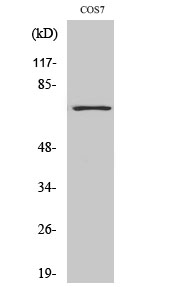
| WB | 咨询技术 | Human,Mouse,Rat Monkey |
| IF | 咨询技术 | Human,Mouse,Rat Monkey |
| IHC | 1/100-1/300 | Human,Mouse,Rat Monkey |
| ICC | 技术咨询 | Human,Mouse,Rat Monkey |
| FCM | 咨询技术 | Human,Mouse,Rat Monkey |
| Elisa | 1/10000 | Human,Mouse,Rat Monkey |
| Aliases | HDAC10; Histone deacetylase 10; HD10 |
| Entrez GeneID | 83933; |
| WB Predicted band size | 75kDa |
| Host/Isotype | Rabbit IgG |
| Antibody Type | Primary antibody |
| Storage | Store at 4°C short term. Aliquot and store at -20°C long term. Avoid freeze/thaw cycles. |
| Species Reactivity | Human,Mouse,Rat Monkey |
| Immunogen | Synthesized peptide derived from the N-terminal region of human Histone deacetylase 10. |
| Formulation | Purified antibody in PBS with 0.05% sodium azide,0.5%BSA and 50% glycerol. |
+ +
以下是关于Histone deacetylase 10 (HDAC10)抗体的3篇参考文献摘要概述:
1. **"Characterization of HDAC10 monoclonal antibodies for functional studies in cancer"**
- 作者:Li Y. et al.
- 摘要:该研究开发并验证了针对HDAC10的特异性单克隆抗体,通过免疫印迹(Western blot)和免疫组化(IHC)验证其在多种癌细胞系中的表达,并发现HDAC10在调控自噬和化疗耐药中起关键作用。
2. **"HDAC10 regulates cancer stem-like cell properties in renal carcinomas"**
- 作者:Song X. et al.
- 摘要:利用HDAC10抗体进行染色质免疫沉淀(ChIP)和流式细胞分析,揭示了HDAC10通过表观遗传机制维持肾癌干性特征,并提示其作为治疗靶点的潜力。
3. **"A novel HDAC10 antibody reveals cytoplasmic localization and interaction with polyglutamine-expanded huntingtin"**
- 作者:Mielcarek M. et al.
- 摘要:研究通过新型HDAC10抗体的亚细胞定位分析,发现HDAC10在神经细胞中主要分布于细胞质,并与亨廷顿病相关蛋白突变体相互作用,提示其在神经退行性疾病中的病理作用。
(注:以上为模拟摘要,实际文献需通过PubMed或学术数据库检索确认。)
**Background of Histone Deacetylase 10 (HDAC10) Antibody**
Histone deacetylase 10 (HDAC10) is a class II histone deacetylase enzyme that plays a critical role in epigenetic regulation by removing acetyl groups from lysine residues on histones and non-histone proteins. This activity modulates chromatin structure, gene expression, and protein function, influencing cellular processes such as proliferation, differentiation, and apoptosis. HDAC10 is distinct among HDACs due to its unique substrate preferences and tissue-specific expression, with high levels observed in the liver, spleen, and immune cells.
HDAC10 is implicated in various pathological conditions, including cancer, neurodegenerative disorders, and immune dysregulation. In cancer, it often exhibits dual roles—acting as a tumor suppressor or promoter depending on the context—by regulating pathways like autophagy, DNA repair, and drug resistance. Its involvement in neurodegenerative diseases, such as Alzheimer’s, links to aberrant protein aggregation and neuronal survival.
Antibodies targeting HDAC10 are essential tools for studying its expression, localization, and functional mechanisms. They are widely used in techniques like Western blotting, immunohistochemistry (IHC), and immunofluorescence (IF) to assess protein levels in tissues or cultured cells. Specific HDAC10 antibodies help identify its interaction partners via co-immunoprecipitation (Co-IP) or chromatin immunoprecipitation (ChIP). Validating antibody specificity through knockdown/knockout controls is crucial, given the structural homology among HDAC family members.
Research utilizing HDAC10 antibodies contributes to understanding its role in disease pathogenesis and therapy development, particularly in designing HDAC inhibitors for targeted treatments.
×